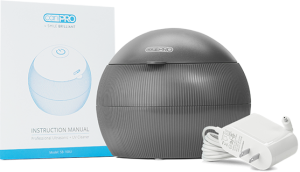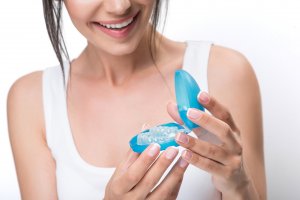Are you wondering how to clean a mouth guard? It's important to keep your mouth guard or night guard clean. If you don't, it can house all sorts of bad bacteria that can lead to cavities and decay, or even make you sick.
Fortunately, night guards are easy to clean with products you probably already have in the pantry, including baking soda, soap, or hydrogen peroxide. There are also plenty of mouth guard cleaners that you can buy at the drugstore or online that will get the job done easily.
In this article, we'll talk about:
- The best way to clean a mouth guard
- How to disinfect a mouthguard
- Best mouthguard cleaners you can buy
We hope this information helps you keep your mouthguard clean and your mouth healthy.
In This Article
How to clean a mouth guard
You should have no problem keeping your mouth guard clean, mainly because there are so many easy ways to do so. First, we'll go over some of the most common ways to clean your mouth guard, and then we'll talk about how often you should be doing it.
Night guard cleaning methods
The following night guard cleaning methods are all legitimate ways to keep your mouth guard clean. However, depending on the condition of your night guard, and how long it's been since you've last cleaned it, some of these solutions will work better than others.

You also may need to consider the material of your night guard, as some more abrasive products shouldn't be used on softer materials.
Ultrasonic cleaner for mouthguards
An ultrasonic cleaner is a pod that you can use to clean your mouthguards, retainers, dentures, and more.
There aren't many brands making them yet, and right now, the frontrunner is the cariPRO Ultrasonic Cleaner.

It looks like a sphere or a pod, and to use it, you fill the pod with water, place your mouthguard inside, and then press the power button.
The UV-C sanitizing light kills 99.9% of bacteria and viruses, with 40,000 kHz of cleaning power. It cleans for 5 minutes, and then shuts off automatically, so you don't have to worry about it.
While it is generally safe for all devices, check with the manufacturer of yours to make sure before using it.
Get your cariPRO Ultrasonic Cleaner now for a cleaner, healthier mouth guard.
Clean your night guard with toothpaste
Unless the manufacturer specifies not to, you can gently clean your night guard with toothpaste. Make sure you use a brush with soft bristles and that you're using non-abrasive toothpaste — stay away from whitening toothpaste, for instance.
You should use a different toothbrush to clean your night guard than the one you use to clean your teeth. That way you can avoid any potential cross-contamination.
To clean your night guard with toothpaste, follow these steps:
- Rinse your night guard in lukewarm or cool water.
- Put a small, pea-size amount of toothpaste on the toothbrush.
- Using the toothbrush, gently brush the mouthguard like you would your teeth.
- Rinse your mouthguard and leave it out in the open to dry.
Cleaning a nightguard with soap
You can use soap to wash your night guard too (again, unless the manufacturer specifies otherwise). Types of soap that you can use include dish soap, antibacterial soap, or all-purpose Castille soap.
To clean your mouthguard with soap, follow these steps:
- Rinse your night guard in lukewarm or cool water.
- Put a small amount of soap on your mouthguard (since it's liquid it probably won't stay on your toothbrush).
- Brush your mouthguard with gentle strokes until you've cleaned every spot.
- Rinse the mouthguard to remove the soap and the soapy taste.
- Leave your mouthguard in the open to let it dry.
Mouthwash for night guard cleaning
At some point, you've probably wondered if you can use mouthwash as a night guard cleaning solution. The answer is yes, especially if your mouthwash is antimicrobial and alcohol-free.
Follow these steps to clean your mouth guard with mouthwash:
- Rinse your mouthguard with lukewarm water.
- Pour a capful of mouthwash into a clean cup.
- Add enough water to the solution to cover your night guard.
- Soak your night guard in the solution for 30 minutes.
- Remove your night guard and rinse with water.
- Let your night guard dry completely before storing it.
Baking soda for cleaning a night guard
Baking soda is known for its ability to remove bad odors and get rid of stains, which is perfect if your mouth guard doesn't exactly smell like roses.
Here's how to clean your night guard with baking soda:
- Add equal parts baking soda and water to a bowl and mix to create a paste (you won't need much).
- Dip your toothbrush into the paste.
- Gently brush your mouthguard, taking special care because baking soda is abrasive.
- Rinse your mouthguard and let it dry.
Hydrogen peroxide for mouth guard cleaning
Everyone's favorite household cleaning agent can also be used to clean your mouthguard, and for this method, we're going to be mixing it with vinegar.
Here's how to do it:
- Soak your night guard in distilled white vinegar for 30 minutes.
- Rinse the night guard and then soak in hydrogen peroxide for 30 minutes.
- Thoroughly rinse with water and allow to dry.
Denture or retainer cleaner for mouth guards
One of the easiest ways to clean your mouth guard is to purchase a retainer or denture cleaner, like this all-purpose device cleaner from cariPRO, or this one from Retainer Brite. Follow the instructions on the cleaner package, but generally, all you have to do is dissolve a denture-cleaning tablet in water, and soak your night guard for up to an hour.
Mouthguard cleaning tablets
One of the best ways to clean your mouth guard is to purchase a solution made specifically for the purpose, like the cariPRO mouthguard cleaning tablets mentioned above, or these ones from Polident.
This method involves letting the tablet dissolve in warm water and then soaking your mouth guard for 3 to 5 minutes and gently brushing.
How often should I clean my night guard?

These cleaning methods should be used at least once a month, but it's certainly not necessary to do every day. You should use one of these cleaning methods after you are sick as well.
However, you should always rinse your night guard as soon as you take it out in the morning, and after rinsing, give it a gentle brushing with a toothbrush. Make sure to let your night guard dry completely on a flat, clean surface. It should take around 15 to 20 minutes to dry.
After it's dry, store it in your night guard case in a dry place (so probably not your bathroom).
When should I get a new night guard?
It depends on the kind of night guard that you have, but a quality custom night guard can last from 1 to 5 years. Signs that you should replace your night guard include cracks, holes, or warping.
Additionally, if it has an odor that you can't get rid of, or is severely discolored you should replace it. And if it's causing your mouth to hurt or it's become irritating, that could be a sign that it's crawling with bad bacteria.
Is there black mold on my night guard?
Black mold will look like small black spots and may have a slimy texture. It could also smell musty. If that sounds like your night guard, clean it thoroughly or just get a new one.
You may be able to clean black mold from a night guard, but if you suspect the mold remains after a deep cleaning, then it's time to toss it.
Mold is bad enough if it's in your home and you are breathing it, but in your mouth? You could get seriously sick. To avoid this in the first place, keep your mouthguard clean, and always let it dry completely in an open space before storing it in its container.
Make sure the container is completely dry as well, and keep it in a cool, dry place — so it's best not to store it in your bathroom.
Conclusion
You should always make sure to keep your mouth guard clean because not doing so could cause some serious harm to your oral and overall health. Thankfully, it's easy to clean mouth guards — you can use household products like hydrogen peroxide or baking soda, or you can buy cleaning products over the counter.
You really only need to clean adult or kids' mouthguards thoroughly once per month, but you should make sure to rinse your mouth guard every time you take it out and let it dry thoroughly before storing it in a cool and dry place.
If you notice your mouthguard has an odor that you can't get rid of or has serious staining or even mold, it's time to get a new one.




